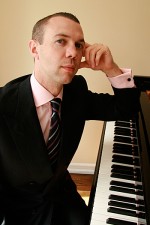Column Name
Title
Born and raised in Montgomery, Ala., Michael Shinn received his bachelor’s and master’s degrees in piano performance from Juilliard (in 2002 and 2004, respectively) and his D.M.A. from the Graduate Center of the City University of New York. His first college teaching experience was at Bronx Community College; he joined the Juilliard Evening Division in 2006 and the College Division in 2007. He also maintains a small private piano studio, and in 2011, he and his wife, music history faculty member Jessica Chow Shinn (D.M.A. ’10, collaborative piano), started a music festival in Sonoma County, Calif., called pianoSonoma, where they teach and perform every summer. In his limited spare time, Michael has also been helping Juilliard eLearning, an online music curriculum for schools that launched in January.
Body
When did you first know you wanted to be a musician?
I think I was around 12 years old when I really fell in love with music. In addition to all the support from my pianist-parents, I began listening to some great recordings that really inspired me.
What were some of them?
The first recordings I heard—and really listened to, over and over again—were of Horowitz and Rachmaninoff at the piano. The recording of Horowitz from his return to Moscow is forever engrained into my memory, as are Rachmaninoff’s recordings of his own concertos. These were musicians whose freedom and artistry were simply unmatched, and it made a huge impact on me at an early stage.
Who was the teacher or mentor who most inspired you?
Without a doubt, my father, Ronald Shinn. He was my piano teacher until I came to Juilliard as a freshman. Dad has an innate curiosity for musical investigation that has always inspired me to seek more. He is astonishingly supportive and always seems to find a way to inspire his students to achieve a higher level of artistry. I would also add that everything I know about teaching I learned from him.
What’s the most embarrassing moment you’ve had as a performer?
Evidently I have a knack for breaking pianos in a variety of ways. One time, I was performing Debussy’s Images, and in Hommage à Rameau, the entire pedal mechanism began to slip down away from the piano. Debussy sans pedal did not work out so well, so I had to stop and request assistance. Another time, I was playing Ravel’s Jeux d’eau, and in the black-key glissando, I broke off the F-sharp just above middle C. Unfortunately, the very next piece on the program was in F-sharp minor!
How compatible are being a musician and an entrepreneur?
To be a successful musician one must have a tremendous work ethic and persistence as well as the creativity and innovative thought necessary for artistic excellence. These attributes are exactly the skills required for successful entrepreneurship. I would argue that being a musician and an entrepreneur go hand in hand.
Is there anything you wish you’d known about being an entrepreneur before you became one?
Pursuing any new idea, or rather, pursuing any idea in a new way, creates endless opportunities for learning and growth. While trial-and-error can be a powerful method for learning the how-to, seeking wise advice and following it can certainly streamline one’s approach. Furthermore, as artists, we should strive to cultivate our interpersonal skills as we pursue our new and brilliant ideas. While many of us have the work ethic and creativity, successful people skills are the final requirement for entrepreneurial success.
If you could have your students visit any place in the world, where would it be?
I have a feeling my students could tell me where to go, as so many have traveled so far! But I’d have to say if they haven’t been, Leipzig is the place. It’s such a beautiful city with such a rich artistic history. And you can go have a dessert at Café Baum, where Goethe and Schumann were regulars.
What are your nonmusic interests or hobbies?
I’m a passionate triathlete, having completed one full Ironman and numerous shorter-distance races over the last six years. It’s a wonderful sport that requires the same level of focus and consistency as preparing for a big concert. Even the nerves at the starting line are similar!
What would people be surprised to know about you?
That I’m originally from Alabama. Aside from the occasional use of the word y’all, which I quickly eradicated from my vocabulary upon arrival in New York, I never had any semblance of an accent, so it’s difficult to convince people of my origin. Alabama is really a beautiful state filled with great and creative people, but for some reason, most New Yorkers don’t seem to believe me on that point.
If your students could only remember one thing from your teaching, what would it be?
The one thing I want my students to take away from my teaching is that one’s musical education never ends. As musicians, we are presented with the opportunity—and obligation!—to explore, deepen, and enrich the artistic world that surrounds us.
What social media do you follow?
I have a Facebook account, but avoid it like the plague. Jessica and I have a Twitter account for pianoSonoma, but I admit that I abandon it during the school year. Social media is not something I love. I much prefer spending time with people face to face!
If you weren’t in the career you are in, what would you be doing?
Well, my aunt has always joked that I should have been a used-car salesman, but I prefer to think that if my musical talents were replaced by a propensity toward speed, I might have become a professional triathlete. Sadly, I am not that fast, but fortunately, I absolutely love my life in music.





